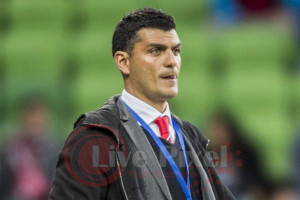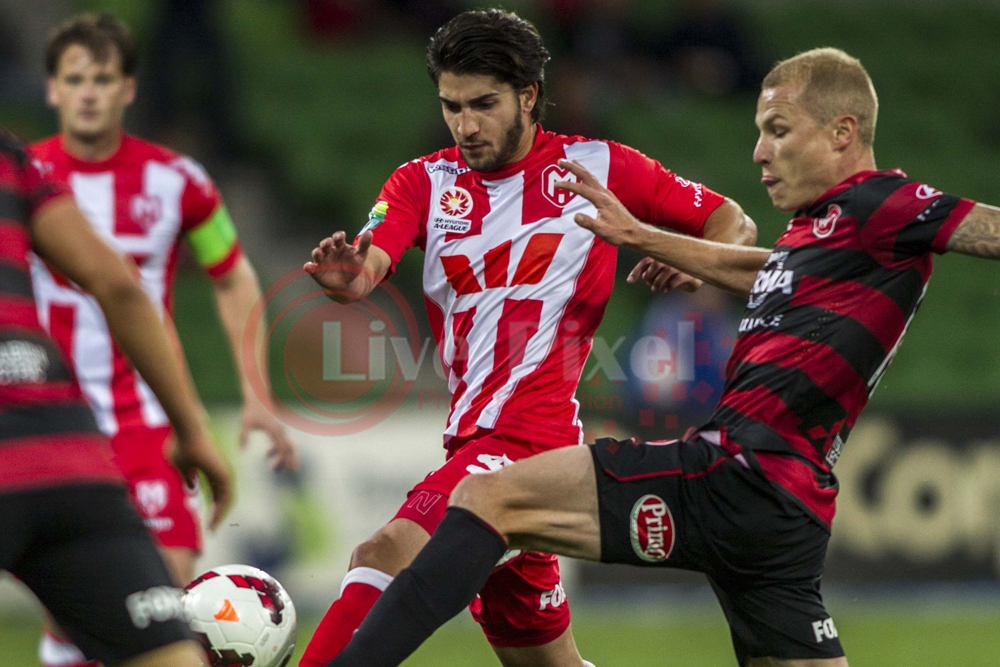It has been a slow start to the season for Melbourne Heart, who now find themselves rooted to the foot of the table after their loss to Western Sydney Wanderers on Friday night. They are without a win in the opening five games, and pressure is surely mounting on the club to turn things around soon.
There was no one singing Heart’s praises this week, unlike last week’s away loss to Brisbane. They took a step backwards and were outdone by a solid and efficient Wanderers outfit. Shannon Cole’s 27th minute strike was enough to seal the points for the Red and Black, as Heart failed to find their shooting boots with a flurry of missed chances to finish the match.
Long injury list hurting Heart

Going into this clash, Heart had several players sitting on the sidelines including Patrick Kisnorbo, Jason Hoffman, Jonathan Germano, Dylan Macallister, Orlando Engelaar and last but not least Harry Kewell, who declared himself fit in a press conference only to roll on his ankle in training later on. Heart could be forgiven to think they have an injury curse, and Andrea Migliorini was struck down with an injury before the match causing a last minute reshuffle of the line-up.
Injuries are one of the most common excuses for things going wrong, but it’s hard to deny that their list of walking wounded is not hurting them. Kewell is sorely missed, even though he’s only played 68 minutes of football for Heart this campaign. It is evident that Heart’s game plan was built around using their captain as a No. 10, creating openings for their pacey forward line. While David Williams is doing his best to fill the void, he lacks the experience in that position to be fully effective in it, and against a solid block like the Wanderers have, he struggled to find good areas to receive possession. It led to their front three looking isolated and at times he resorted to hopeful pot shots from distance which did not test Wanderers ‘keeper Ante Covic.
Deeper in midfield, Andrea Migliorini’s absence meant that Paulo Retre was handed his first A-League start and his lack of experience shone through in this match, as he failed to get on the ball anywhere near as often as Migliorini would have. Retre almost looked like a place card occupying space on the pitch, and in turn meant that Massimo Murdocca was picking up plenty of the slack, having to drop into areas where he was less effective, and throwing off Heart’s midfield dynamic.
In defence, Kisnorbo and Hoffman’s absence was telling, as Patrick Gerhardt and Jeremy Walker failed to stake a claim for a starting berth when those two regain fitness. Gerhardt was the culprit in Heart’s loss to Brisbane, wandering out of position allowing Brisbane space to punish Heart, and his penchant for going on a walkabout cost them again in this game. He was well out of position when he should have been helping cover Robbie Wielart as his partner challenged Tomi Juric for a header, which was weak and fell to Shannon Cole who gleefully hit home the winning goal. Jeremy Walker also had a tough night, with Brendon Santalab and later Mark Bridge causing the young fullback some problems which he failed to deal with adequately, missing tackles and looking slightly off the pace.
Heart’s back up players are being asked to do jobs that they struggling to handle at the present time, and it is a big problem as long as their first choice players are sitting on the sidelines.
Problems in the front third

One look at the stats will tell a story of exactly why Heart lost this match. They had 19 shots to Western Sydney’s 13, but the stat that counted was shots from outside the box, of which Heart had 12, two thirds of their entire shot count, while Wanderers had only two. It is a damming statistic which shows the the team’s deficiencies in terms of penetrating a defensive wall.
Maltese international Michael Mifsud looked lively when he actually received possession, but when he did he was almost always isolated. All his support options were hidden behind Wanderers’ defenders or simply out of passing range. As a result, he ended up losing possession, providing only one key pass resulting in a shooting chance, and only had two shots himself in the contest. The one from outside the box went closer to the Yarraside than it did to Covic.
David Williams was the chief shooter from outside the area, with three out of his three shots for the match coming from well outside the box. He also struggled to provide any key passes, with only one in the entire match. It is a problem for Williams, who apart from his two goals against Central Coast, hasn’t looked like troubling the scorers in his other appearances, let alone this one.
There isn’t even much to speak about with Iain Ramsay, while he was a creative outlet on the left wing, didn’t contribute much in terms of finishing. He did take one free kick, which was skied high and wide.
Golgol Mebrahtu also had a difficult night out on the right wing, with almost all of his passes going backwards, and not hitting any of his shots on target.
Finishing is proving to be a bit of a weak link for Heart, and their pressure in the last ten minutes resulted in nothing. It was the same story in Brisbane after a barnstorming first half, where they failed to hit the target with their clear cut chances, and paid the price. It happened again against the Wanderers and it is something that they must get on top of if they are to overcome the challenge of Sydney FC in their next match.
Heart still lack Plan B

Another of Heart’s problems is that they have become predictable to their opponents, and their Plan A is becoming easy to stop. Mike Mulvey admitted he set up his Brisbane side to sit back to watch Heart’s balls over the top for the quick front men, only for Heart to come out pressing high up the pitch and destroying that plan. But once Mulvey switched it around, Heart were outdone tactically and along with poor finishing and defending, lost the match.
It may just be Aloisi’s coaching inexperience shining through as he has continually failed to respond to any changes opposing managers throw up to him in game. Graham Arnold made a couple of substitutions in their 2-2 comeback draw against Heart in Round 2, another game where Aloisi’s men looked like getting a win, but then didn’t respond to their opponent’s switch of game plan and only came away with a miserly point.
Tony Popovic had a comfortable game, ensuring his side was alert to both the high press and counter attacking balls over the top. He brought in Matthew Spiranovic for the latter problem, and his performance on Friday night was efficient and tidy. Shannon Cole was brought in to partner Jerome Polenz on the right flank and nullify the double threat of Behich and Ramsay. It worked a treat. Heart were unable to find any of their attacking outlets and just couldn’t break down Wanderers’ solid structure.
Aloisi while paralysed by a lack of quality options on the bench, still failed to find an adequate response to the Wanderers’ tactics, and the pressure at the end was more of a result of the away side trying to protect a lead than any revelation Aloisi had.
He has not had the best record in his first senior coaching job, and should he not find a way out of this mire, could be seeing his time at the club come to a close sooner rather than later.
Heart now come up against Sydney FC, and have many problems to overcome in this match, but it is almost becoming a do-or-die situation as the rest of the league begins to pull away. Heart have to find their scoring touch, as well as iron out defensive problems without any of their injured stars, who are all likely to miss again.

